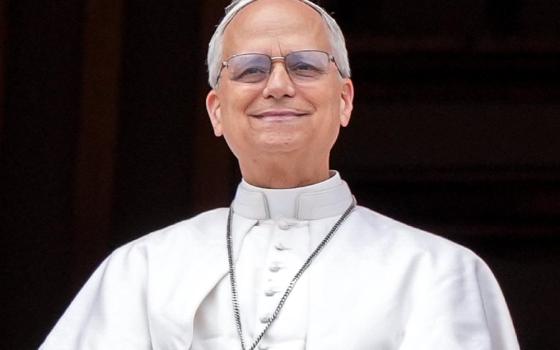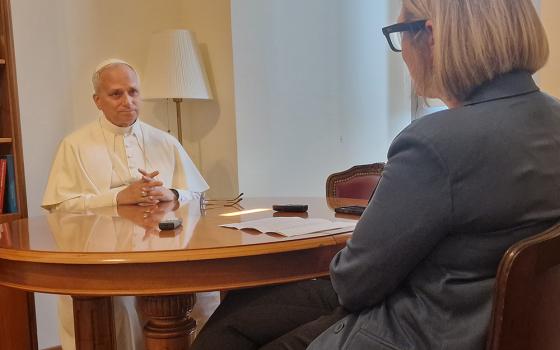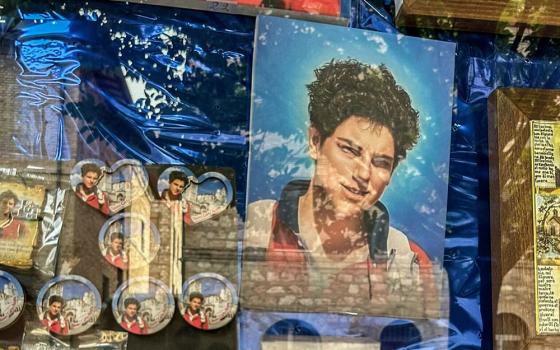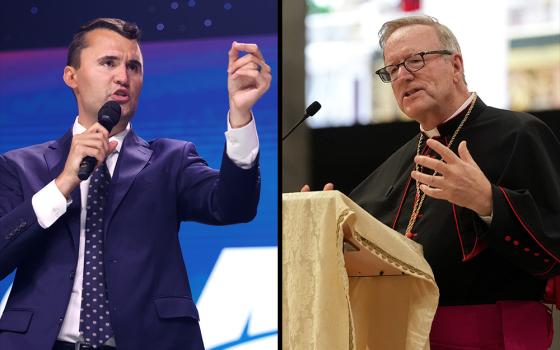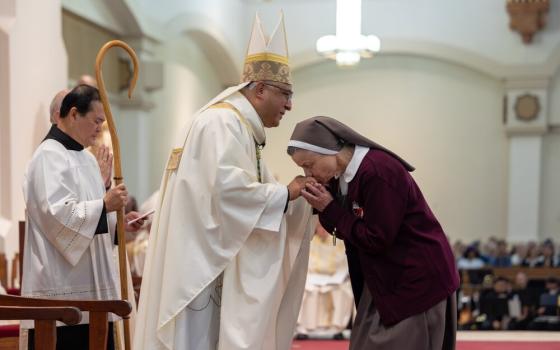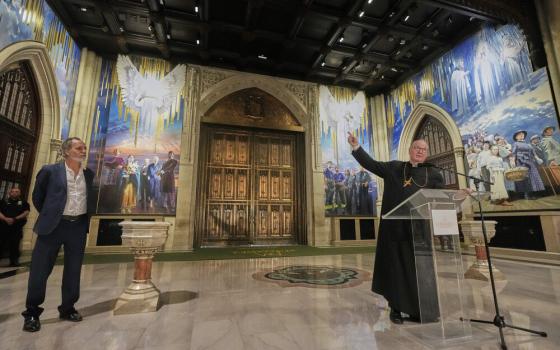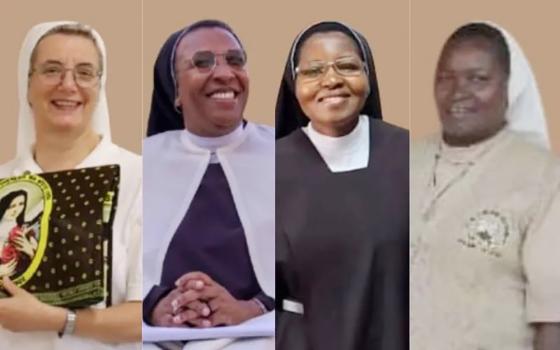In this 2012 photo, Frs. Dave Holloway of the Diocese of Kansas City-St. Joseph, Missouri, and Ted Olson of the Diocese of Orange, California, participate in morning prayers April 25 on the third day of the annual National Federation of Priests' Councils convention in Nashville, Tennessee. (CNS/Tennessee Register/Theresa Laurence)
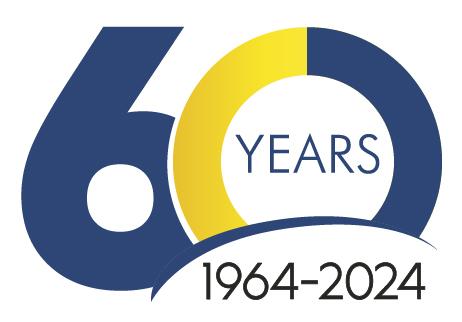
(NCR logo/Toni-Ann Ortiz)
In the wake of the Second Vatican Council, a wave of now-familiar but then-novel structures emerged: bishops' conferences, priests' councils, parish councils and diocesan pastoral councils.
The National Catholic Reporter, founded more than 60 years ago during those Vatican II reforms, has covered many of these groups closely from the beginning
In 1968, the National Federation of Priests' Councils was founded, after a year of work by a committee of eight priests, all from the Midwest. The group was convinced that "episcopal collegiality could not be truly effective without presbyteral collegiality."
It was designed to be a voice for the U.S. presbyterate — akin to that provided to the episcopate by the National Conference of Catholic Bishops, which would later merge with the United States Catholic Conference to become the U.S. Conference of Catholic Bishops. The priests' council, known as NFPC, operated for decades, often engaged in the post-conciliar turmoil characterizing the life of the U.S. church.
The first major run-in with ecclesial power was the statement the NFPC drafted at its 1971 convention calling for "optional celibacy" for Catholic priests. NCR board member, Jim Purcell, who was ordained a priest in the Archdiocese of San Francisco in 1965, served as one of five priests who drafted the statement.
The story below written by Rick Casey and published in our March 26, 1971, issue, features voices on both sides of the issue, illustrating the richness of the federation's debate.
Little has changed in the bishop selection process, with the prospect relegated by Pope Francis to one of 10 study groups parallel to the ongoing synod on synodality.
And Francis also declined the request to ordain married men from more than two-thirds of the voting members of the Synod of Bishops for the Amazon.
NCR recently reported that CORPUS — another group of priests which was committed to the cause of married priests — disbanded.
Casey's report of the 1971 NFPC convention is a firsthand historical account of the Second Vatican Council's impact on the life of the U.S. church.
NFPC endorses optional celibacy
By Rick Casey
Special to the National Catholic Reporter
BALTIMORE — New modes of choosing bishops and an immediate end of mandatory celibacy for priests were endorsed in a statement on the priesthood adopted by an overwhelming majority at the annual meeting of the National Federation of Priests' Councils.
The seven-page statement, approved by a vote of 193 to 18 with 3 abstentions, calls for more participation of priests and laity in the selection of bishops and for limited terms of office for bishops.
Regarding the issue of celibacy, the statement asks "that the choice between celibacy and marriage for priests now active in the ministry be allowed, and that the change begin immediately."
It also asks that the ordination of married men be permitted and "that priests who have already married be invited to resume the active ministry."
The NFPC, a four-year-old coalition of priests' senates and associations, claims to represent 60 per cent of the nation's 59,000 priests in 122 of the 148 U.S. dioceses.
According to the statement and a study done for the NFPC, the problem of leadership in the church is most important to American priests. The statement asserts that most difficulties arise from the refusal of bishops to share responsibility for the ministry of the local church.
The statement, divided into an introduction, five sections and a conclusion, also asks bishops to provide freedom and financial assistance for experiments to develop new forms of ministry; demands due process for all members of the church and "complete openness and accountability from all who serve the church in any of its institutional structures"; and calls for "a rededication of priests to the mission of the church today, and to a reform of institutions within it, a reform which provides the climate of freedom to hear the call of the spirit."

Phil and Linda Marcin are joined by their sons Phillip, far left, and Joshua, at right, for an annual family witness for married priests, outside St. John the Evangelist Cathedral in Cleveland in 1996, on the day of the priestly ordination Mass. (Courtesy of Phil and Linda Marcin)
The statement was issued in anticipation of the synod of bishops, which will occur this fall in Rome. The priesthood and world justice will be the two agenda items for the synod. The U.S. bishops will meet next month in Detroit to consider the same topics and to elect four representatives to the synod.
Although several convention speakers addressed themselves to the problem of celibacy, the issue was not debated hotly among delegates. In a roll call vote on the celibacy section of the statement, asked for by the minority to register their opposition, the count was 182 to 23, with three abstentions. About half the opposition was from New York and New England.
Fr. William Graney, executive secretary of NFPC, said the mood of the delegates with regard to celibacy had changed surprisingly from that shown at last year's meeting.
Some of the delegates indicated concern over the emphasis on the celibacy issue. Fr. Joseph H. Voor, a delegate from Louisville, told NCR his delegation was more interested in stressing the freedom of ministry. He said they were for optional celibacy not so much because they like the idea, but because they think it is inevitable.
"If you are a doctor and a patient's running sore is a symptom of cancer, you have to treat the sore or the patient doesn't think you are doing anything," he said.
In the convention's keynote address, Fr. Theodore Hesburgh, president of the University of Notre Dame, supported the election of bishops for limited terms, but he spoke negatively of optional celibacy.
Under the present procedure for selecting bishops, he said, "everything seems to lead to the selection of men who are safe, uncontroversial, favorably disposed to Rome and preferably Roman educated, seminary rectors or canon lawyers or episcopal secretaries in a word, generally those who will not make waves."
He said elections, though not perfect, would "avoid the horrible human anomaly that exists in some dioceses in the world today where the vast majority of priests and people simply reject the ecclesiastical leader imposed on them by the system."
Although in a press conference he said he was "not opposed" to optional celibacy, Father Hesburgh made it clear that he was not excited by the prospect.
"I do not discount the possible contribution of married priests, particularly in certain areas of contemporary life," he said in his speech. "But they will not be the shock troops that will carry the day against the monumental powers of darkness that presently threaten the people of God."
He also objected to the term "optional celibacy like optional salad or optional power steering." There must be "a better ideal presented than 'maybe yes' or 'maybe no' to the question of total dedication," he said.

Cardinal Christoph Schonborn of Vienna, center, and bishops from around the world walk in procession from St. Peter's Basilica at the start of the Synod of Bishops for the Amazon at the Vatican in this Oct. 7, 2019, file photo. Pope Francis declined the request to ordain married men from more than two-thirds of the voting members of the synod. (CNS/Paul Haring)
The speech came under heavy criticism during the convention. Fr. John Hill, executive director of the Alliance Against Repression, a Chicago organization, speaking later on a panel on creative ministry, called Hesburgh's speech "Olympian, patronizing and demoralizing."
Although NFPC officials strike optimistic poses about the synod this fall, few if any of the priests at the convention expected any positive action toward optional celibacy this year.
Fr. Frank Bonnike, NFPC president, cited polls commissioned by the NFPC showing that the majority of priests and two thirds of the people in America would favor allowing priests to marry.
"Knowing how we feel and how the people feel we expect that (the synod) would at least offer to take the weight of this decision off the pope's shoulders," he said. "We hope that the matter of optional celibacy will at least be referred to national conferences of bishops, that Pope Paul will say, 'You know your priests and your people, you decide what is best.' "
But another NFPC official told NCR he could not realistically expect changes while Paul is pope, since he has come out so strongly against optional celibacy.
The main value of a strong statement in favor of optional celibacy was seen as forcing the issue into debate. "I am happy the debate is finally joined in a public arena," said Fr. James Schaeffer, a Baltimore priest who opposes optional celibacy. "I'm sorry only that Pope Paul didn't call it and the bishops didn't lead us in the discussion. It now has a clandestine air which prejudices the debate."
But the bishops must join the discussion now or face a "tragic" loss of credibility, said NFPC's Graney.
Father Hill and another member of the panel on creative ministry also criticized the priests with being too concerned with changing the institutional church.
Speaking on the requirements of a new ministry. Fr. Eugene J. Schallert, a Jesuit sociologist of the University of San Francisco, said part of the problem of the church is that it still thinks in the mode of "scholastic philosophy of forms mutable only accidentally."
"When you find yourself thinking or acting in terms of finished forms, closed categories ... or merely structural changes, you will be discovering in yourself at least the residues of an archaic philosophy of 'immutable' forms and purely receptive minds." He said geographical parishes could not be made functional parishes tomorrow, "but you could probably begin tomorrow to set up some type of functional sub-parishes which would give to 'new' churches and 'new' brotherhoods.''
Advertisement
Father Hill catalogued the problems that face human society and told the clergy, "First bring justice into the affairs of men and then you can return to the altar to celebrate this.
"I am saying that we should talk less about ecclesiastical and liturgical matters because our country is in deep trouble, and we must give ourselves to the struggle to make things right," he said.
The priests took strong stands in resolutions on several issues.
- They agreed by a close vote to attempt to raise $90,000 for Cesar Chavez' farmworkers' strike fund.
- They voiced unanimous support for the National Office for Black Catholics and urged the bishops to be open to negotiations that will lead to adequate funding of the NOBC.
- They "unhesitatingly" condemned the continuation of the U.S. involvement in the war in Southeast Asia. An amendment including North Vietnam in the condemnation was narrowly turned down for lack of a two-thirds majority. Another resolution urging North Vietnam to accept a ceasefire and a negotiated settlement passed easily.
- They tabled a resolution supporting the church's antiabortion stand. The arguments against the resolution were that it merely added to the church's already strong voice on the matter; that it spoke only to the problem of unmarried mothers; and that it did not speak positively on the problem of human sexuality.
- They opposed a peacetime draft and universal national service, with three dissenting votes.
- They supported selective conscientious objection, with one dissenting vote.
- They supported the "Harrisburg Six," who were indicted on charges of conspiring to kidnap presidential aide Henry Kissinger and to blow up heating tunnels in Washington, D.C. There was one dissenting vote.
- They voted to ask the U.S. bishops to nominate Fr. Frank Bonnike, NFPC president, as an auditor at the world synod of bishops, and to consider nominating other priests to be named by the NFPC executive board.
- They directed the executive board to commission a group of theologians to develop a theology of the married priesthood.

